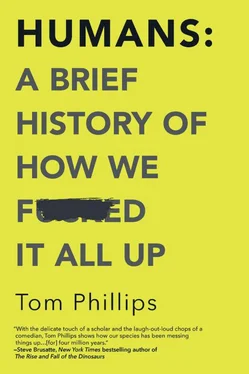Tom Phillips - Humans - A Brief History of How We F*cked It All Up
Здесь есть возможность читать онлайн «Tom Phillips - Humans - A Brief History of How We F*cked It All Up» весь текст электронной книги совершенно бесплатно (целиком полную версию без сокращений). В некоторых случаях можно слушать аудио, скачать через торрент в формате fb2 и присутствует краткое содержание. Город: Toronto, Год выпуска: 2019, ISBN: 2019, Издательство: Hanover Square Press, Жанр: История, Юмористические книги, на английском языке. Описание произведения, (предисловие) а так же отзывы посетителей доступны на портале библиотеки ЛибКат.
- Название:Humans: A Brief History of How We F*cked It All Up
- Автор:
- Издательство:Hanover Square Press
- Жанр:
- Год:2019
- Город:Toronto
- ISBN:978-1-48805-113-5
- Рейтинг книги:4 / 5. Голосов: 1
-
Избранное:Добавить в избранное
- Отзывы:
-
Ваша оценка:
- 80
- 1
- 2
- 3
- 4
- 5
Humans: A Brief History of How We F*cked It All Up: краткое содержание, описание и аннотация
Предлагаем к чтению аннотацию, описание, краткое содержание или предисловие (зависит от того, что написал сам автор книги «Humans: A Brief History of How We F*cked It All Up»). Если вы не нашли необходимую информацию о книге — напишите в комментариях, мы постараемся отыскать её.
Humans: A Brief History of How We F*cked It All Up — читать онлайн бесплатно полную книгу (весь текст) целиком
Ниже представлен текст книги, разбитый по страницам. Система сохранения места последней прочитанной страницы, позволяет с удобством читать онлайн бесплатно книгу «Humans: A Brief History of How We F*cked It All Up», без необходимости каждый раз заново искать на чём Вы остановились. Поставьте закладку, и сможете в любой момент перейти на страницу, на которой закончили чтение.
Интервал:
Закладка:
To put it mildly, the East India Company were not wild about the prospect of competition. They, along with much of the rest of London’s mercantile community, had been spooked as hell by the financial troubles of the decade, and had recorded massive losses that year. At this point, the Company of Scotland hadn’t settled on Panama as their goal and (in the entirely vain hope of keeping things supersecret) hadn’t even mentioned the idea of an American expedition publicly. Instead, as the full name of the company suggested, they were selling the scheme as one that would focus on Africa or the East Indies. To which the East India Company’s predictable response was, to roughly paraphrase, “Not on your fucking life.”
And so the company whose wealth and power was inextricably tied up with the success of the English imperial project put their influence into action. This was the Company of Scotland’s first lesson in the brutal realpolitik of global trade: that just because you say, “We want to do lots of international trade,” and furthermore that you want to do it on your own wish list of terms, doesn’t mean that the rest of the world is simply going to agree with you.
The English parliament was outraged about the terms of the Scottish act, which had shot itself in the foot by granting the Company a free-trade pipe dream: complete exemption from customs and import tariffs and taxes for twenty-one years. How would this affect the customs and trade relationship between England and Scotland, the English MPs wanted to know, and how had the Scottish parliament been allowed to pass it? Lacking a hard border between the countries, they warned that “the said Commodities will unavoidably be brought by the Scotch into England by Stealth… to the great detriment of Your Majesty in Your Customs.”
The English parliament held inquiries and ordered reports and threatened to impeach just about anybody who’d been involved in the Company. King William, taking the side of the English (to nobody’s great surprise), let it be known that he was royally pissed off. At which point, all of those pledges of investment from London mysteriously vanished into nothingness.
The story was the same when the Company tried to raise funds overseas, in the trading capitals of Amsterdam and Hamburg. The Dutch East India Company was no happier about this state of affairs than their English counterparts, and their efforts—combined with a wily English diplomat who executed a superlative whisper campaign against the venture—ensured that Paterson and his colleagues had lots of coffee meetings where they were pumped for information on their plans, but left with little in the way of actual cash.
But if the efforts of the English state to crush Scottish dreams worked wonders at choking off outside investment, they had precisely the opposite effect inside Scotland. Fueled by the justified sense of unfairness over their treatment, the people of Scotland embraced the Company not just as a financial opportunity but as an expression of national identity. Paterson may not have intended the Darien scheme as a flag-waving exercise—he was only really interested in putting his theories about trade into practice—but ever the salesman, he knew when to ride a wave of public sentiment, and so happily yoked his economic experiment to the surge of patriotic fervor and nationalist resentment.
When the subscription book for the Company was opened in Edinburgh on February 26, 1696, it attracted major crowds, which wasn’t exactly normal for what was in effect Accountancy: Live! Scots absolutely poured money into the scheme. Scotland was not a wealthy country at the time, but even during the seven ill years it was not quite a poor one, either. Like much of the rest of Europe, it had a burgeoning middle class, and they were among the scheme’s most enthusiastic backers—unlike other joint-stock companies such as the East India Company, whose investors tended to be limited to the nobility and wealthy merchants. According to historian and author Douglas Watt, who examined the Company’s records for his book The Price of Scotland , it was small landowners outside the nobility who were the largest single group of backers. But it didn’t stop there. A remarkable cross-section of Scottish society pledged their money to the Company—from the titled great and the good to lawyers, doctors, ministers of the church, teachers, tailors, soldiers, watchmakers, at least one “soap-boiler” and even some of the wealthier servants. The enthusiasm was infectious. Tales of the awesome riches waiting in the colonies were the talk of the town; songs and poems were written in praise of the Company, and prayers were said for its good fortune.
It’s hard to be precise, given the vagaries of history and the fact that there were two currencies operating in the country, but Watt estimates that somewhere between one sixth and an entire half of the total monetary wealth in Scotland at the time was paid into the Company’s coffers. When you include the full amount pledged (as only part of the cash was required to be paid up front), it’s possible that the promised funds actually exceeded the total value of coins in the country.
This is, just to be clear, not a good thing.
Paterson seems to have understood well how financial manias could be fueled, and used this to his advantage. In fact, he discussed it in terms that seem eerily like our modern understanding of “going viral.” He wrote in a 1695 letter that “if a thing goe not on with the first heat, the raising of a Fund seldom or never succeeds, the multitude being commonly ledd more by example than Reason.” One key factor may have been that the subscription book for the Company was not private, but public, and indeed was deliberately published by the Company so everybody could see who the investors were. And Paterson deliberately targeted prominent public figures (“influencers,” if you will) to be early supporters, in the hope that they would be the example to others that would lead them more powerfully than reason. Like some sort of seventeenth-century Kickstarter or GoFundMe page, this turned the act of backing the Company from a personal financial choice into a public declaration of allegiance—and it made those not backing it conspicuous by their absence.
Naturally this all led to a self-reinforcing spiral of social pressure, and created an atmosphere in which opposing or skeptical voices were aggressively drowned out. In 1696, John Holland (the Englishman who founded the Bank of Scotland) recorded unhappily that when he tried to criticize the scheme, he was accused of being a spy for the East India Company. “Such is the zeal of the nation to the Indian and African Trade,” he wrote, “that many are thereby prejudiced against me; and because they cannot answer what I have argued against their design, they tell one another, we must not believe what Mr. Holland sayeth, for he is an English man… it is become dangerous for a man to express his thoughts freely of this matter, people being under more awe and fear of giving their opinion…”
The combination of outrage over English actions, surging patriotic self-belief, lofty promises and a compelling vision, the trick of turning support into a performative act and the good old-fashioned lure of making a quick buck created just about the most fertile possible environment for a runaway mania. And so it was that on July 14, 1698, as cheering crowds waved them off, five vessels set sail from Leith, carrying aboard them William Paterson and 1,200 other hopeful souls, all bound for a Central American destination that Paterson had never been to.
Oh yeah, had we not mentioned that bit? WILLIAM PATERSON HAD NEVER EVEN BEEN TO DARIEN.
Quite why our boy became so fixated on Darien as the site of his grand trade experiment remains to this day a bit of a mystery. He had certainly spent a lot of time in the Caribbean as a merchant, but there’s no evidence in his biography or his public writings that he ever came anywhere close to the Panamanian isthmus. Instead, he seems to have heard tales of it from, in all probability, pirates. (This was during the Golden Age of Piracy, when the real-life, non-CGI Pirates of the Caribbean were doing their thing, either as true rogue elements or often with the nod-and-a-wink backing of governments who wanted them to harass their colonial rivals.)
Читать дальшеИнтервал:
Закладка:
Похожие книги на «Humans: A Brief History of How We F*cked It All Up»
Представляем Вашему вниманию похожие книги на «Humans: A Brief History of How We F*cked It All Up» списком для выбора. Мы отобрали схожую по названию и смыслу литературу в надежде предоставить читателям больше вариантов отыскать новые, интересные, ещё непрочитанные произведения.
Обсуждение, отзывы о книге «Humans: A Brief History of How We F*cked It All Up» и просто собственные мнения читателей. Оставьте ваши комментарии, напишите, что Вы думаете о произведении, его смысле или главных героях. Укажите что конкретно понравилось, а что нет, и почему Вы так считаете.












